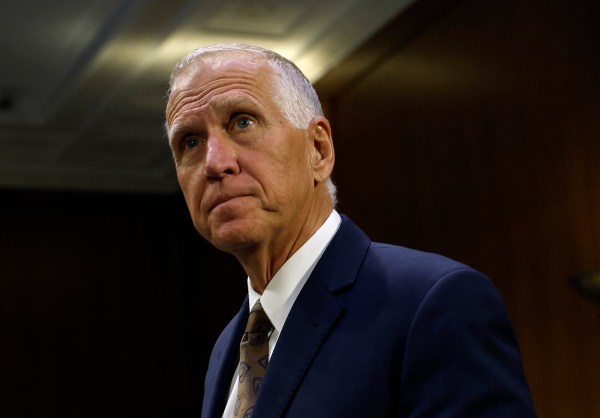Happy Tuesday! And a very happy birthday to former President Jimmy Carter! He turns 100 years old today, making him the first U.S. president to reach triple digits. As a special gift to him, Carter’s beloved Atlanta Braves clinched a spot in the playoffs last night.
Quick Hits: Today’s Top Stories
- More than 130 people have died across the six states—North Carolina, South Carolina, Georgia, Florida, Tennessee, and Virginia—as a result of Hurricane Helene, which pummeled the Southeast over the weekend. North Carolina, where some cities and towns are still unreachable, reported a third of the currently known fatalities. In towns across the region, roads remain flooded, communications are challenged, water services are inoperable, and search-and-rescue efforts are ongoing. Hundreds of people are still missing, and the death toll is expected to rise.
- Israeli officials said Monday that Israel Defense Forces commando units had begun to conduct small incursions into southern Lebanon over the past several days, in possible preparation for a wider ground invasion. American officials said Monday that they believed any invasion would be a limited one, citing their belief that they had persuaded Israel not to conduct a large-scale offensive. On Monday, Israeli Defense Minister Yoav Gallant told mayors of towns in northern Israel that “the next phase of the war against Hezbollah will soon commence.” The Defense Department said Monday that the United States is also deploying several thousand more troops to the Middle East—mainly fighter-jet squadrons and units previously scheduled to rotate out of the region—to protect American citizens and to defend Israel if needed.
- North American Aerospace Defense Command (NORAD) said Monday that a Russian fighter jet flew dangerously close to a U.S. warplane off the coast of Alaska on September 23, during an intercept of Russian jets flying in the U.S. air defense identification zone. Additionally, on September 18, U.S. soldiers with mobile rocket launchers were deployed to Alaskan islands following a spike in Russian air and naval activity in the region. NORAD commander Gen. Gregory Guillot said that the Russian jet’s conduct was “unsafe, unprofessional, and endangered all—not what you’d see in a professional air force.”
- At least 192 people died, and 32 remain missing, as a result of two days of heavy rainfall in Nepal. The rains, caused by a low-pressure system over the Bay of Bengal and parts of India, caused deadly floods and landslides that also stranded more than 100,000 people in northern Bangladesh, according to officials. Large areas of farmland have been inundated, and homes, bridges, and other infrastructure—often constructed along riverbanks—have been flooded. The government is still assessing the full extent of the damage.
- Japan’s incoming prime minister, Shigeru Ishiba, on Monday announced he would call a snap election for October 27 after winning a close race on Friday to succeed outgoing Prime Minister Fumio Kishida as leader of the Liberal Democratic Party (LDP). “It is important for the new administration to be judged by the people as soon as possible,” Ishiba said at a press conference on Monday. Ishiba has said that his administration will focus on revitalizing the economy, addressing security threats from China and North Korea, and regaining public trust after several scandals. The LDP remains Japan’s most popular party going into the election.
- The Department of Justice last week indicted three Iranian nationals on charges related to a hack targeting the Trump presidential campaign. The trio—Masoud Jalili, Yaser Balaghi, and Seyyed Ali Aghamiri—were allegedly employed by Iran’s Islamic Revolutionary Guard Corps, a U.S.-designated terrorist organization. They are charged with 18 criminal counts for efforts to gain illegal access to email accounts of Trump allies and campaign officials with the aim of leaking incriminating information. The State Department issued, concurrent with the charging announcement, a reward for information about the whereabouts of the men.
- The International Longshoremen’s Association (ILA)—a union representing dock workers across the country—on Sunday announced plans for a general strike at all Atlantic and Gulf Coast ports beginning at 12:01 a.m. Tuesday morning. The ILA is negotiating with the United States Maritime Alliance (USMX)—the employers’ group—over benefits and wages, as well as resisting attempts to automate some processes on the docks. Trucking and freight rail companies scrambled in recent days to move as much cargo as possible before the strike begins, as each day of port blockages represents roughly a week of goods to clear out. Some 43 to 49 percent of imported containerized goods come to the U.S. through the ports facing strikes.
- Thousands of residents of Conyers, Georgia, were evacuated on Sunday after a fire broke out at a Biolab chemical plant east of Atlanta. The fire broke out at 5:30 a.m. Sunday morning and firefighters’ water hoses activated the chlorine in the facility, sending plumes of the gas into the air. The Environmental Protection Agency (EPA) on Monday confirmed the presence of chlorine gas in the area, and a shelter-in-place advisory has been issued for about 77,000 residents.
- The Biden administration on Monday announced new asylum restrictions at the southern border. Under previous rules, U.S. officials could restrict asylum access when the number of migrants attempting to enter the country reached 2,500 a day, and restrictions could not be lifted until the number of attempted crossings averaged 1,500 a day for a week. Under the new rules, attempted crossings must average 1,500 a day for nearly a month for restrictions to be lifted, and all children, not just migrant children from Mexico, will be counted as part of that number. The seven-day average currently stands at 1,800 migrants per day.
- In a letter to Republican Rep. Tony Gonzalez of Texas on Friday, Deputy Director of Immigration and Customs Enforcement (ICE) Patrick Lechleitner said that as of July 21, there were “662,566 noncitizens with criminal histories” on ICE’s docket, and only roughly 15,000 of those people were at that point detained by ICE. The Department of Homeland Security—ICE’s parent agency—later said that the data goes back decades, so many of the people with criminal histories could have entered the country any time in the last 40 years. It added that many on the “non-detained” docket may be in the custody of other federal, state, or local authorities.
- Ryan Wesley Routh, accused of plotting to kill former president Donald Trump at his West Palm Beach golf course last month, pleaded “not guilty” to all charges on Monday. Other than the attempted assassination charge, Routh is being charged with assaulting a federal officer and three weapons charges. If convicted on all counts, he faces life imprisonment.
- The Federal Reserve’s preferred measure of inflation, the personal consumption expenditures (PCE) price index, increased 2.2 percent year-over-year in August, the Bureau of Economic Analysis reported Friday—down from a 2.5 percent annual rate one month earlier and marking the lowest inflation report since February 2021. Even after stripping out more volatile food and energy prices, core PCE increased at a 2.7 percent annual rate in August, nearing the Fed’s 2 percent target and suggesting the U.S. economy was close to achieving the so-called “soft landing”—lowering inflation without sacrificing high employment.
- Basketball Hall of Famer Dikembe Mutombo has died of brain cancer at the age of 58, the NBA announced on Monday. The 7-foot-2-inch center, born in the Democratic Republic of Congo, played for Georgetown University and then had an 18-year NBA career. Four-time Defensive Player of the Year, he spent his post-basketball years working for humanitarian causes and trying to expand basketball in Africa.
‘The River’s Coming and We Have to Go’

Once rivers started overrunning their banks, the floods came fast.
Concerned about constant rain that hadn’t stopped in two days, on Friday, Mike Smith, a public health researcher at East Tennessee State University in Johnson City, decided to work from home at his small farm outside the city. On normal days, Smith, his wife Arika, and their three daughters could see the banks of the Nolichucky River about a quarter of a mile away from their home, but not the river itself. By early afternoon, Smith could see the river cresting its banks and spilling into the valley where his house farm sat.
He knew they had to go. “It was shocking how fast it went from, ‘This is not good’ to ‘the river’s coming and we have to go.’”
Federal, state, and local agencies are rushing aid to communities across six states devastated by Hurricane Helene—with areas in the Appalachian Mountains particularly hard-hit in this once-in-a-generation storm. Search and rescue efforts continue, but even as the full scope of the damage—and, indeed, the number of fatalities—is still becoming clear, partisans, including former President Donald Trump, have tried to politicize the disaster and amplify lies about the emergency response.
Early last week, the National Weather Service’s (NWS) Greenville-Spartanburg, South Carolina, office issued its first warnings of potential strong rainfall as Hurricane Helene began to form. Throughout the week as Helene approached, the tone and tenor of those warnings escalated. First, it was just “heavy rainfall.” On Tuesday evening, the office warned that the storm “has the potential to be an extremely rare event.” By Wednesday, NWS concluded that what was coming to the Appalachian region could potentially be “an extremely rare event with catastrophic …
As a non-paying reader, you are receiving a truncated version of The Morning Dispatch. Our 2,195-word item on Hurricane Helene’s path of destruction is available in the members-only version of TMD.
Worth Your Time
- The team over at Tim Mak’s substack, The Counteroffensive, delivers an account of a visit to the grave of Oleksii Mes, Ukraine’s first F-16 pilot, who was recently killed in a friendly fire incident. “It was the first loss of an F-16 in Ukraine, and the first loss of one of its pilots,” they wrote. “The pilot was a remarkable man, a talented aviator, and a successful advocate for Ukraine’s effort to rally the West’s attention to the cruel war now taking place in his country. Oleksii’s death has consequences for the future of the war: on the West’s willingness to train pilots and provide F-16s; on domestic morale; and on how Ukrainian air power will be used going forward. But most of all it accents a single point that has echoed since February 2022: Ukraine is losing its very, very best.”
- For Politico, Jonathan Martin reports from Springfield, Ohio, on Republican Gov. Mike DeWine’s efforts to lead the community through a crisis instigated by his party’s presidential nominee. “DeWine knows well we’re living through a recurring part of history at the moment: when increased immigration levels are met with backlash and opportunistic politicians feast,” Martin wrote. “We talked about how many times, and with how many groups, migration has prompted ‘great backlash,’ as he put it. ‘We’re a nation of immigrants and we have to continue to have people come into this country who want to work and want to contribute,’ DeWine said. ‘That’s how we have vitality.’ He sounded like a Republican unfrozen from another cycle of history.”
Presented Without Comment
NBC News: ‘It’s Very Complex’: Biden Struggles With Being Out of the National Conversation
Also Presented Without Comment
Former President Donald Trump, discussing Project 2025 with the Washington Post’s Marc Thiessen:
“The head guy called me up. I said, ‘You have no right to write a thing like that. You’re not speaking for me,’” Trump told me, referring to the [Heritage Foundation] president, Kevin Roberts. “I said, ‘You really—what you did is terrible.’”
“Not only that,” he added. “They were interviewing people for jobs, which isn’t so good.”
In the Zeitgeist
Dikembe Mutombo, basketball Hall of Famer and humanitarian, has died of brain cancer at age 58, the NBA announced Monday. The 7-foot-2 Congolese-American was one of the best defensive players of all time and a master shot-blocker:
Toeing the Company Line
- In a special debate night edition of Dispatch Live (🔒), catch the team after the vice presidential debate is over for a recap, analysis, and of course, plenty of viewer questions! Keep an eye out for an email later today with information on how to tune in.
- In the newsletters: The Dispatch Politics crew recapped Harris’ trip to the border, and Nick examined (🔒) whether a 2020 Trump victory would have been better for the country overall.
- On the podcasts: Sarah and David break down the Eric Adams indictment and take a look back at the Supreme Court’s term on Advisory Opinions.
- On the site: John McCormack unpacks Tucker Carlson’s curious and worrisome evolution, David Daoud and Ahmad Sharawi argue an Israeli ground invasion is coming, Stirewalt previews tonight’s vice presidential debate, Daniel Krauthammer says the debate moderators should press J.D. Vance on isolationism, and Aayush Goodapaty covers the Tory leadership race.













Please note that we at The Dispatch hold ourselves, our work, and our commenters to a higher standard than other places on the internet. We welcome comments that foster genuine debate or discussion—including comments critical of us or our work—but responses that include ad hominem attacks on fellow Dispatch members or are intended to stoke fear and anger may be moderated.
With your membership, you only have the ability to comment on The Morning Dispatch articles. Consider upgrading to join the conversation everywhere.